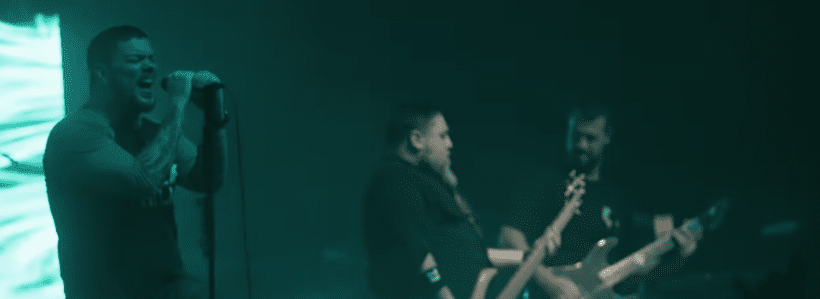
US groove/metalcore powerhouse Chimaira enjoyed an over fifteen-year run as a staple in their genre, releasing albums on large labels (Roadrunner, Nuclear Blast), headlining numerous tours and, as you’ll learn, guiding listeners and fans through hard times in their lives. Founding vocalist Mark Hunter has struggled with mental illness—he has been diagnosed with bipolar disorder—an idea he explores in Down Again, a new short film directed by Nick Cavalier (Forced Perspective) that focuses on Hunter’s use of art and music to battle mental illness.
Hunter spoke with Decibel about his experiences with Chimaira and mental illness, and how the two intersect, in a new interview. Check it out below, and give Down Again a watch. A short film, it’s under 28 minutes—it takes less time to watch than to listen to Reign in Blood!—and illuminates challenges and struggles that are not unique to Hunter or touring musicians. You can find more info about Hunter and the cast on Down Again‘s official website.
Let’s start from the beginning: where did you get the idea to make Down Again? What did you do once the idea was born?
Nick and I met at Acting Out! fest in Cleveland. Acting Out! is an event that features artists of all types coming together in the name of mental health and addiction. Nick and I both have a form of bipolar known as Hypomania, and, after speaking on the panel, he had the idea to take it to the screen.
You live with bipolar disorder and speak in the documentary about how performing helps alleviate symptoms of mental illness for you. Was there a “lightbulb moment,” so to speak, when you realized that music and art could help you?
I think it was when I started to learn how to play instruments in my teens. I could get lost in the music a completely different way. Playing along to my favorite Led Zeppelin track on drums or learning Slayer’s guitar riffs was a fantastic source of therapy. But once I started screaming along to hardcore music, the game changed.
In the video, a fan speaks about how Chimaira’s music helped her push through leukemia treatments. How do you react when someone tells you a story like this about how lyrics you wrote guided them through dark times?
I really don’t know how to react. On one hand, I’m completely aware of how impactful music is. When the coin flips and someone tells me that my music helps heal, I don’t always understand how. I immediately want to introduce them to “way better” music, or I’ll simply tense up. Once I get past any and all insecurities, I appreciate it immensely.
“Down Again” isn’t just the name of your documentary; it’s also the name of a song on The Impossibility of Reason, one of the albums from Chimaira’s time on Roadrunner. Why “Down Again” of all your songs?
You have to ask the director, Nick Cavalier, that one if you want the 100% truth behind it. I’ll speculate that it was one of the songs that he appreciated growing up in the ways in which we’re trying to convey through the film. It probably served as a powerful tool for him. Also, “down again” is a good way to describe the highs and lows of mania. One minute you’re up, the next you’re down. Again.
With photography as your main source of art now, do you think you will ever return to music in any capacity? Do you have an interest in serious touring now, or does that not seem manageable or enjoyable now?
The thought of traveling away from home fills me with anxiety. Especially when I think about going to Europe or something. But I know if something was booked, I’d also be the first to jump up with excitement. I don’t need music at this time but I wouldn’t mind doing a lot more with it down the road.
Looking back on your career with Chimaira, which ran for the better part of two decades, are you proud of what you accomplished despite the setbacks and obstacles?
Absolutely. We accomplished a lot for an aggressive sounding band with a hard name to spell and pronounce. Sometimes I wonder how we got put on certain tours or festivals that enabled us to have such a long career. Setbacks and failure are key to success. I don’t like the negative shit that comes along with it at times, but man, do you learn a lot and grow. If we went back out, we would be such an efficient powerhouse that printed money. Nobody would know what hit them.
With the added bonus of perspective, what would you tell a young person who is struggling with mental illness and its symptoms?
There’s no reason to keep things inside. If your parents or family don’t want to talk about it, find a friend that will. If friends are too concerned with their own lives, turn inward and have the conversation with yourself. Be real with yourself and listen. Cognitive behavioral therapy focuses on finding solutions for problems. We tend to just focus on the problems.






